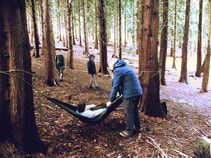 Alex Williams and Vicki Stewart were recently featured in the news for writing and running a brand new course, the Level 3 in Neurodiversity and Challenging Behaviour in the Outdoors. They hoped that it would allow teachers and people working with children with these needs to take learning outside. Research has shown that learning outside is effective and beneficial for children with these needs, yet adults working with them sometimes don’t have the confidence or knowledge to work outdoors effectively and safely. An estimated 27, 000 people in the UK have been given the label of challenging behaviour and over time this label has become misused. The term challenging behaviour should encourage carers and professionals to find effective ways of understanding a person’s behaviour and its underlying causes. Neurodiversity is an essential form of human diversity. The idea that there is one “normal” or “healthy” type of brain or mind or one “right” style of neurocognitive functioning, is no more valid than the idea that there is one “normal” or “right” gender, race or culture. On the Level 3 Neurodiversity and Challenging Behaviour in the Outdoors course we cover Attention & Hyperactivity; Autism; Adverse Childhood Experiences, Trauma, Anxiety, Depression, Oppositional Defiance, Additional Needs in Education and much more. We’ve written a case study about the course (link at the bottom of the article) and the latest article about the forthcoming course is (link at the bottom of the article) Case Study: How our outdoor course helps students attend school, engage with learning and increase staff confidence . Case Study: Neurodiversity & Challenging Behaviour in the Outdoors Level 3 The course was developed in response to our own experience of working with vulnerable and SEND children from non-mainstream schools. Vicki and I strongly felt that Outdoor Leadership and Forest School practice needed to be updated with methods to engage and communicate with neurodiverse children. We felt that Outdoor and Forest School leaders who were increasingly being asked to go and work with harder to reach young people were very under-prepared and could put themselves and others at risk , as well as not being supported in how to engage with these children to address their wide ranging needs. We felt outdoor and Forest School leaders wanted further training, to support them in communicating and engaging hard-to-reach people; work with challenging behaviour; understand a range of neurodiverse conditions; work in trauma informed ways and develop targeted strategies for engagement. We also felt that Outdoor and Forest school leaders needed robust health and safety and safeguarding measures in place for effective working with these vulnerable groups. After researching what was available Vicki and I discovered there were no accredited awards specifically for the outdoor industry that dealt with challenging behaviour and neuordiversity, they were aimed at classroom practitioners. We researched qualifications to find something accessible yet with the depth of content we needed and wrote this course specifically for those working wth children and young people outdoors. Training Time: 4 days + portfolio with access to 24/7 online resources. Up to 9 months to complete the portfolio, working at your own pace in your own setting. Following this course you will be able to: Recognise a range of mental health, challenging behaviour and forms of neurodiversity including ADHD, ASD, Dyslexia, Dyspraxia, Anxiety, Depression, Trauma, ACEs, SEN, Challenging Behaviour, ODD and more. Use a range of effective strategies designed specifically for neurodiversity and challenging behaviour in the outdoors in order to engage; create effective learning and development and de-escalate challenging situations. Use a range of effective strategies including the 3 'R's to re-establish trust and effective learning after incidents that challenge. Use a range of effective strategies to evaluate the effectiveness of learning and development when working with neurodiversity and challenging behaviour. Be able to risk assess outdoor learning provision for this range of needs to HSE standards. Be able to put in place safeguarding measures for outdoor learning provsion for this range of vulnerable needs. "I've been in education for 30 years and this is the course I wish I'd done when I started. It's the missing link." "A practical, involving and engaging course with hugely useful value to practice." " I would recommend this course to all Forest School Leaders." "Amazing, very supportive environment, training and group." We asked how likely are you to recommend this course to someone else? They said: "Very!" " Absolutely & I will do!" Clients include: Somerset County Council, Otterhead Forest School, Cambium Sustainable Forest School Trainers; Forest School Leaders, Teachers, Outdoor Education Professionals, Teaching Assistants.
0 Comments
Your comment will be posted after it is approved.
Leave a Reply. |
AuthorVicki Stewart is the Director of Brightwood Training Limited. She is an ex-RAF Training Officer with a Masters Degree in Development Training in the Outdoors. Experienced team building trainer, Forest School Level 4 Trainer and Approved Forest School Therapeutic Practitioner she writes and teaches nature connection and people development , reviews for academic journals and leads training in outdoor learning and programmes for Universities, companies, mainstream and alternative education. Archives
July 2021
Categories |



 RSS Feed
RSS Feed
